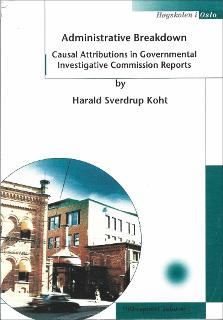Administrative Breakdown: Causal Attributions in Governmental Investigative Commission Reports
Doctoral thesis
Published version
Permanent lenke
https://hdl.handle.net/11250/2787468Utgivelsesdato
2000Metadata
Vis full innførselSamlinger
- Publikasjoner fra Cristin [3269]
- SAM - Handelshøyskolen [392]
Sammendrag
The dissertation analyzes public investigation reports from Norway and the United States in the 19th and 20th centuries using psychological attribution theory. Avandlingen analyserer offentlige granskingsrapporter fra Norge og USA i det 19. og 20. århundrede ved hjelp av psykologisk attribusjonsteori. This dissertation compares governmental investigative commission reports about disasters across two national cultures to assess explanations for changes in the evaluation of administrative failures. A review of selected commission reports from Norway and the United States suggests that a pattern of blaming individuals for disasters has over time been replaced by a tendency toward faulting organizational systems. A central question is whether this trend is related to changes in the character of the investigated events or to changes in the conceptual framework used by commission members. The research examines three alternative explanations for the adoption of the system view: (1) changes in the professional composition of commissions, (2) the emergence of modern public administration theory, and (3) the dominant political culture at the time. Propositions drawn from general systems theory, cultural theory, and attribution theory are applied to the commission reports. Data for the dissertation consists of sixty-four commission reports produced by the governments of Norway and the United States. Characteristics of the commissions, their members, and findings are categorized and examined using univariate and bivariate analysis. The analysis of American reports shows that attributing administrative failure to system errors became prominent at the beginning of the twentieth century concurrent with the influence of the Progressive movement in politics as well as the emergence of public administration as a subdiscipline of political science. The maintenance of the system view in commission reports of the modern era is shown to be related to the professional composition of the commissions. The analysis shows that in Norway the trend toward system blame manifested itself much later in this century with a reduction of the influence of lawyers and the inclusion of other professions as investigative commission members from the 1960s and onward. While emphasis on system blame in theory weakens traditional principles of personal and political accountability, the actual shift toward system blame strongly suggests that modern investigative commissions principally serve as policy evaluators and initiators of system change. Thereby commissions help to make public administration more accountable and responsive.
